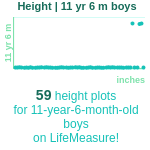Boys Height chart in feet for Children 11 years & 6 months old

General Summary: 11 years & 6 months old boys height
In most cases, height measurements for 11 years & 6 months old boys will be in the range between 4 and 5 feet 3 inches. The average height for 11 years & 6 months old boys is 4 feet and 9 inches, according to the CDC and anonymized data from users.
All Results
Enter your height measurements above to see how they compare
So far, we have recorded [0] height measurements for 11-years-6-months boys on LifeMeasure!
(chart updates daily)
See more ages